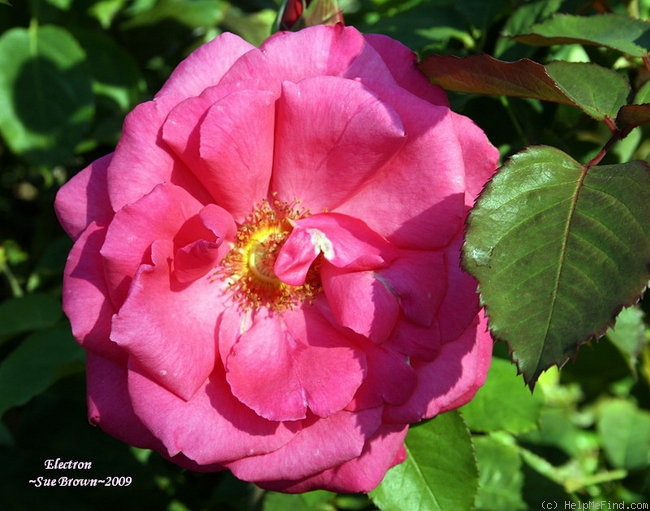|
|
'Electron ®' rose Description

Photo courtesy of Calif Sue
HMF Ratings:
55 favorite votes.
Average rating:
EXCELLENT-.
ARS:
Deep pink Hybrid Tea. Registration name: Mullard JubileeExhibition name: Electron ®
Bloom:
Rose-pink. Flowers shocking pink. Cherry pink. Cerise pink. Carmine.. Mild to strong, old rose, spice fragrance. 32 to 40 petals. Average diameter 5". Large, full (26-40 petals), borne mostly solitary, exhibition, high-centered bloom form. Blooms in flushes throughout the season.
Habit:
Medium, armed with thorns / prickles, bushy, compact, upright, well-branched. Large, glossy, dark green foliage.
Height: 2' to 4' (60 to 120cm). Width: 2' to 4' (60 to 120cm).
Growing:
USDA zone 6a and warmer. Can be used for cut flower, exhibition or garden. Prefers cool sites.. Disease susceptibility: very disease resistant. Spring Pruning: Remove old canes and dead or diseased wood and cut back canes that cross. In warmer climates, cut back the remaining canes by about one-third. In colder areas, you'll probably find you'll have to prune a little more than that.
Breeder's notes:
Mullard Jubilee - 62/3585.Nicknamed Paddy Prima. Named for electronics company
Notes:
In September 1998, the Montreal Botanical Garden (Le Jardin Botanique de Montreal) carried out a survey of its roses' resistance to black spot, powdery mildew and rust. This is one of the outstanding varieties which showed a 0% to 5% infection rate. The data was taken on well-established roses.
|